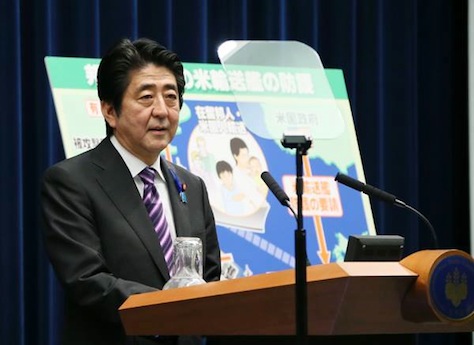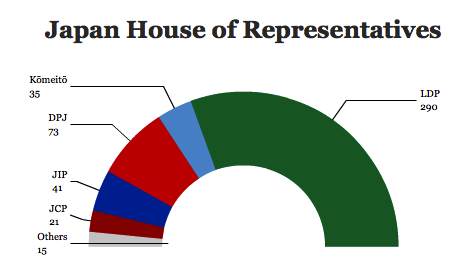As expected, Japan’s prime minister Shinzō Abe (安倍 晋三) and the governing Liberal Democratic Party of Japan (LDP, or 自由民主党, Jiyū-Minshutō) easy won snap elections called less than three weeks ago.![]()
Despite growing doubts about Japan’s precarious economy, which entered an official recession last quarter, Abe maintained a two-thirds majority in the lower house of Japan’s parliament. The most amazing fact of the election is that Japan’s opposition parties, despite a feeble effort against Abe’s push for reelection, lost virtually no ground.
* * * * *
RELATED: Abe calls snap elections in Japan as recession returns
* * * * *
Nevertheless, it’s hard not to conclude from the results and the sudden December election campaign that Japan today has essentially returned to one-party rule for the time being. It puts a grim end to a period that began in 1993 with the first non-LDP government in over 40 years, and that culminated with the clear mandate of the Democratic Party of Japan (DPJ, or 民主党, Minshutō) in the 2009 general election. The DPJ cycled through three different prime ministers in three years, and it often appeared to stumble in its efforts to respond to the global financial crisis, longstanding declines in demographic and economic trends and the 2011 meltdown of the Fukushima nuclear reactor.
By December 2012, with promises of a massive new wave of monetary and fiscal stimulus, Abe (pictured above) swept the DPJ out of office, wining a two-thirds majority in conjunction with its junior coalition partner, the Buddhist, conservative and generally more pacifist Kōmeitō (公明党). That coalition, which controlled 326 seats in the House of Representatives, the lower house of Japan’s parliament, the Diet (国会), will now control 325 seats after Sunday’s election.
After its defeat in 2012, the Democratic Party elected Banri Kaieda (海江田 万里) as its new leader, essentially its fourth party head in four years. Kaieda, however, presented as an uninspiring choice for leader and he never seemed to grasp just how much rebuilding would be required in the aftermath of the party’s wipeout. Kaieda lost his own Tokyo constituency on Sunday, and will step down as party leader. But with just 198 candidates contesting the 325 seats elected directly, the DPJ was unprepared to wage a credible campaign to retake the Japanese government. Continue reading Japan is once again an essentially one-party country

